Resources
What is Food Urbanism?
Upcoming events
You don't have access to any upcoming eventsSearch
Support

- FUI is supported by a grant from the Swiss National Science Foundation under the National Research Programme NRP 65 "New Urban Quality"
Typology >Place urbaine
Description
On définit une place comme étant un espace découvert dans les villes, généralement entouré de constructions. Devant un édifice d’importance, il peut servir de parvis, mettant ainsi en valeur ce dernier. Ces surfaces principalement minérales sont et ont toujours été des surfaces d’échanges, aussi bien financiers qu’humains. Elles permettent l’établissement ou l’extension de marchés journalier ou pérenne selon la saison.
Contexte urbain
La dispersion dans la ville de différentes places participe à l’animation humaine de par leur vocation principalement piétonne. Elles permettent l’installation de différentes activités sportives ou de loisir, donnant à ces surfaces une vie spontanée permanente.
Composante environnementale
Étant principalement couvertes d’un revêtement minéral, les places publiques sont que très peu végétalisées. Néanmoins, ces surfaces sont parsemées de différents points végétaux se traduisant par des alignements d’arbres et plates-bandes. Ces grandes masses végétales et les constructions alentour peuvent péjorer la production végétale établie sur le site.
Possibilités
Visibilité du lieu, impact sur la population.
Entretien facilité (matériel sur place).
Facilité de mise en place d’installations éphémères.
Contraintes
Mise en place difficile (autorisation, etc.).
Installation professionnelle quasi impossible.
Ensemble des surfaces déjà utilisées.
Typologie fortement minéralisée.
L’ensemble du matériel doit être importé.
Sensible à toute dégradation.
Surutilisation des lieux.
AGRI-Culture – ville et champs, Geneva 2014
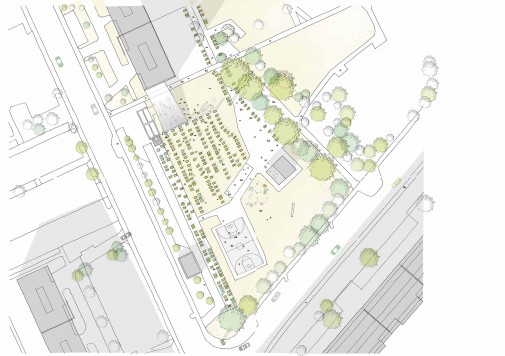
AGRI-Culture addresses three basic topics: the recovery and reclamation of water, the growing, planting, harvesting and
celebrating of food and the appropriation and animation of place.
WATER RECUPERATION
Rainwater harvesting is an essential component to successful
urban agriculture projects. …
+ read more
EARTHLING, SEEDLING – LAUSANNE JARDINS 2014
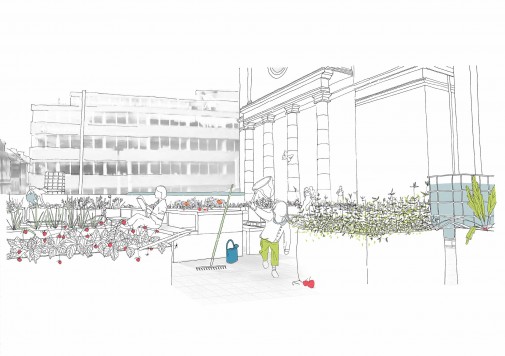
Earthling + Seedling addresses the preciousness of resources such as water and energy, the cycle of growing, planting,
harvesting and enjoying plants for food and the relationships of people and place.
WATER AND ENERGY
Water is a resource which …
+ read more
Where do your vegees come from ?
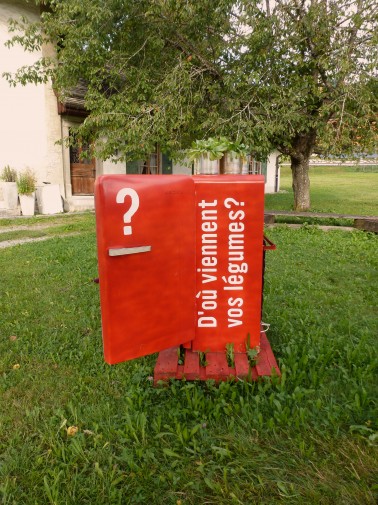
Where do your vegetables come from? In big cities people tend to forget where and how food is produced. The installation was an effort to bring together food consumption and production in a simple direct way. The aim of the …
+ read more
MULTIFUNCTIONAL AGRICULTURE

My Master Thesis in Urban Agriculture_Roma Tre University a.a.2012/2013
The thesis develops a research project in Rome suburbs and it takes account of an area where is expected the edification of 2 new neighborhoods for 4500 inhabitants.
We asked ourselves …
+ read more
Greenhouse Village
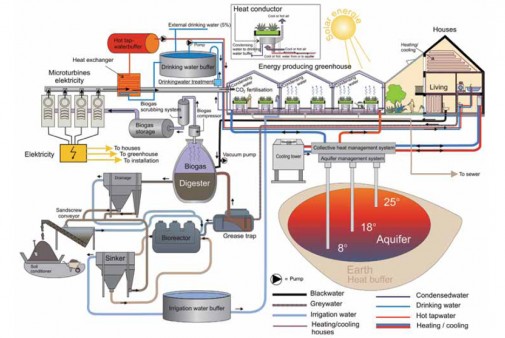
Greenhouse Village is a concept that enables a complete decentralized solution for energy and water supply, waste and water treatment and recycling of nutrients through a shared system between greenhouses and homes. Dutch greenhouses account for almost 100% of the …
+ read more
Deltapark Agropark

The Delta Park represents a combination of non-land-reliant intensive sectors with industrial processing, located on an industrial estate in an urban setting. It combines glasshouse horticulture, protein production, abattoirs, meat processing, waste sorting, recycling, product processing, bio-refinery, the production of …
+ read more
Greenwich Village School GELL

In 2003, New York’s Public School 41 established a garden program through the collaboration of parents and teachers funding by local businesses. The school grows seasonal veggies and herbs, fruit trees, and plants native to the region. Most of the …
+ read more
Strathcona and Cottonwood Community Gardens
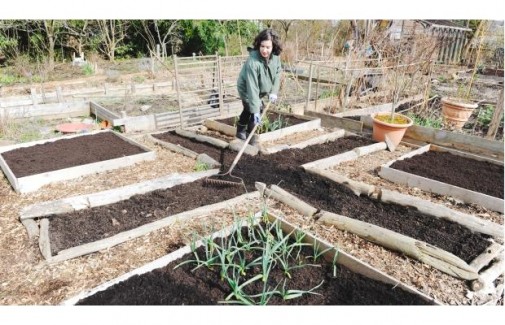
Strathcona Gardens is an organic community garden run by the Stathcona Community Gardeners Society. Members of the community can acquire a plot by paying a small fee and coming to required “work parties”. The garden uses a rainwater cistern, a …
+ read more
Earthworks Farm

Earthworks Farm is the first and oldest organic farm in detroit and is an extension of the Capuchin Soup Kitchen, a Catholic soup kitchen serving the area’s poor. The seven farms (encompassing 20 lots) are spread over 2 blocks. A …
+ read more



